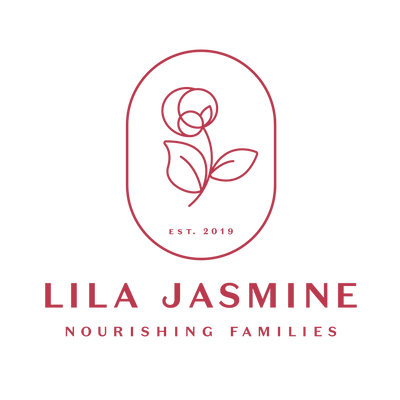Breastfeeding Is Harder Than It Looks But Support Makes It Sustainable
Breastfeeding may be natural, but it doesn’t always come naturally. Despite what the perfect Instagram reel or the antenatal pamphlets suggest, breastfeeding isn’t just about supply and latch it’s about being seen, supported, and surrounded by care.
As a midwife with nearly 20 years in healthcare, and a mum who’s navigated three feeding journeys of my own, I created Lila Jasmine because I knew firsthand that mums in Aotearoa needed more than advice - they needed nourishment, education, and community.
This World Breastfeeding Week, we’re bringing that mission to the forefront. Because when mums are properly supported? Breastfeeding becomes not only sustainable, but empowering.
Let’s Talk Real Life: Why Breastfeeding Feels So Hard
Breastfeeding is often presented as intuitive, but for many, it starts as anything but. Here’s what’s actually normal:
- Your nipples may feel tender and raw in the early days. Some damage is common as your body adjusts.
- Cluster feeding [where your baby feeds often and for long stretches] is normal and exhausting.
- It can take 2–4 weeks before you feel confident and comfortable feeding, even longer if complications arise.
And that’s without juggling toddlers, night wakings, or mental health dips. What matters most isn’t doing it perfectly. It’s having the right support around you.
1. Build Your Breastfeeding Nest
You don’t need a Pinterest-perfect nursery to set yourself up well. What you need is comfort and access. Set up a feeding nook with:
- A dim lamp or salt light for calm night feeds.
- A water bottle and one-handed snacks, our Lactation Bars were made for this exact moment.
- Burp cloths, muslins, spare nappies, nipple balm.
- A long phone charger, your Kindle and a cuddly throw.
Even small setups like this can help reduce overwhelm and protect your energy. Download our free Postpartum Plan to map out your physical and emotional needs for the 4th trimester.
2. Make Nourishment Easy and Automatic
Breastfeeding demands more energy than pregnancy but no one tells you how hard it’ll be to eat when you’re nap-trapped, cluster feeding, or just too tired to cook. You don’t need gourmet meals - you need food that’s done, ready, and easy to eat with one hand. Here’s what helps:
- Freezer meals: say yes to any friend or family member who offers help and don't be too proud to say, "Lunch or dinner would be amazing".
- Slow cooker staples: think stews, curries, dahl or pulled pork. Triple the recipe and freeze portions. Those 9am slow cooker decisions are the 5pm you's love language.
- Snack basket strategy: stock up on easy-to-grap options like fruit, bliss balls, boiled eggs, cheese and crackers, buts, smoothies, lactation bars - all fuel with little to no prep required.
- Pack yourself a lunchbox: if you're already making the kids' lunches pop something together for yourself too. It's an act of self-care disguised as practicality.
You don’t need a perfect meal plan, you need nourishment within arm’s reach. Feeding your baby is a full-time job. Feeding yourself is how you keep going.
3. Support Starts Before Baby Arrives
Too often, parents don’t think about breastfeeding until the baby is in their arms and then it feels overwhelming, painful, or confusing. Prepare ahead by:
- Downloading the BreastFedNZ app.
- Talking to your midwife about colostrum harvesting antenatally.
- Researching local lactation consultants or La Leche League NZ.
- Seeing what breastfeeding education is available in your reigon.
- Taking our 4th Trimester Workshop.
4. Expressing? Make It Practical
Pumping can offer flexibility giving you the freedom to rest, share feeds, or return to work but it also comes with extra routines and gear to manage. The key is making it as simple and sustainable as possible. Here’s what helps:
- Choose the right pump: invest in a hospital-grade electric pump if you'll be expressing regularly. A hands-free pumping bra also makes life easier.
- Cleaning essentials: after each use disassemble all parts that come into contact with milk. Rinse with cold water, then wash with hot soapy water using a dedicated brush or cloth. Let them air dry on a clean towel or drying rack. Avoid dishcloths. Sterilise once daily via boiling, microwave sterilisers or sterilising tablets like Milton.
- Fridge hack: if you're pumping several times a day and your baby is health and over 2 months old the CDC says you consider refrigerating your pump parts between sessions saving you from multiple washes.
- Find a routine that works for you: there's no one-size-fits-all schedule. When not exclusively pumping ome mums pump after morning feeds, some before bed and others in short bursts throughout the day. Start with what feels manageable and then adjust.
5. Sharing Feeds Without Losing the Bond
Whether it’s your partner, childcare provider, or grandparent - other people can help feed your baby. If you're bottle-feeding:
- Use paced feeding method to avoid overfeeding
- Write down feeding cues or baby’s preferred rhythms.
- Share bottle cleaning and prep to lighten your mental load.
This isn’t about losing connection, it’s about protecting your capacity to keep going.
6. Mental Health Deserves Equal Attention
1 in 4 women experience depression during or after pregnancy. 1 in 10 partners do too. This is not a reflection of your ability. It’s a call for support. Some signs that your mental health may need attention:
- Persistent sadness or rage.
- Anxiety that doesn’t ease.
- Feeling numb, resentful, or disconnected
You are not alone. Talk to your GP or midwife. Organisations like PADA offer the Edinburgh Postnatal Depression Screening Tools and support pathways. And please, take care of your mind the way you care for your baby - gently, consistently, and with love.
7. Ask for Help and Be Specific
People want to help, but they often don’t know how. Don’t wait for them to guess. Post a “Support List” on the fridge with things like:
- Empty the dishwasher. Fold clean laundry [even if it goes back in the basket!].
- Top up your water or snack basket.
- Before baby arrives, ask friends to meal prep or plan a snack roster instead of a baby shower. Support should be about you, too.
8. Breastfeeding in Public, With Confidence
You have the legal right to breastfeed in public in Aotearoa. If it feels intimidating:
- Practice at home with layered clothing such as a loose top and singlet combo.
- Use a claw clip to hold your shirt up.
- Scout child-friendly spaces and cafés with play areas or quiet mall corners.
Confidence comes with repetition, and no matter where you’re feeding you’re doing great.
Final Thoughts: You’re Not Just Feeding. You’re Nurturing.
If no one’s told you lately - you’re doing something extraordinary. Even when it feels like a blur of latch, burp, leak, and repeat you’re showing up. You’re nurturing a human with your body, time, and love. That matters. You don’t have to do it alone. You weren’t meant to.

